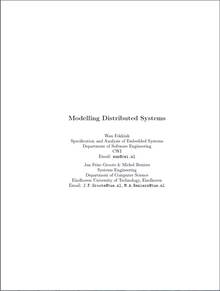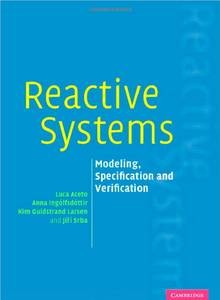System Validation – Readings
Course subject(s)
1. System Validation – An Introduction
2. Strong behavioral equivalences and Weak behavioral equivalences
3. Abstract Data Types
4. Sequential Processes: Theory
5. Coffee Machine Example
6. Parallel Processes: Theory
7. Modal mu-Calculus
8. Model Examination with Solutions
The course System Validation uses the following reading materials :
Modelling and Analysis of Communicating Systems , J.F.Groote and M.R. Mousavi, Eindhoven University of Technology, Eindhoven, 2012.
Modelling Distributed Systems , W. Fokkink, Eindhoven University of Technology, Eindhoven, 2011.
Reactive Systems , L. Aceto, Cambridge, 2007.
Modelling and Analysis of Communicating Systems
Reference: J. F. Groote & M. R. Mousavi (2012), Modelling and Analysis of Communicating Systems.
You can find the first 5 chapters here.
Preface
Chapter 1: Modelling system behaviour
Chapter 2: Actions, behaviour, equivalence and abstraction
Chapter 3: Data types
Chapter 4: Sequential processes
Chapter 5: Parallel processes
Modelling Distributed Systems
Reference: Jan Friso Groote & Michel Reniers (2011), Modelling and Analysis of Communicating Systems. Eindhoven University of Technology.
A distributed system is driven by separate components that are being executed in parallel. In today’s world of wireless and mobile networking, protocols for distributed systems form a major aspect of system design. Verifying the correctness of such protocols is usually a formidable task, as even simple behaviours become wildly complicated when they are executed in parallel. In order to study distributed systems in detail, it is imperative that they are dissected into their concurrent components.

Reactive Systems
Reference: Luca Aceto & Anna Ingólfsdóttir (2007), Reactive Systems. Cambridge University Press. ISBN 978-0521875462
Formal methods is the term used to describe the specification and verification of software and software systems using mathematical logic. Various methodologies have been developed and incorporated into software tools. An important subclass is distributed systems. There are many books that look at particular methodologies for such systems, e.g. CSP, process algebra. This book offers a more balanced introduction for graduate students that describes the various approaches, their strengths and weaknesses, and when they are best used. Milner’s CCS and its operational semantics are introduced, together with notions of behavioral equivalence based on bisimulation techniques and with variants of Hennessy-Milner modal logics. Later in the book, the presented theories are extended to take timing issues into account. The book has arisen from various courses taught in Iceland and Denmark and is designed to give students a broad introduction to the area, with exercises throughout.


System Validation by TU Delft OpenCourseWare is licensed under a Creative Commons Attribution-NonCommercial-ShareAlike 4.0 International License.
Based on a work at https://ocw.tudelft.nl/courses/system-validation/.



